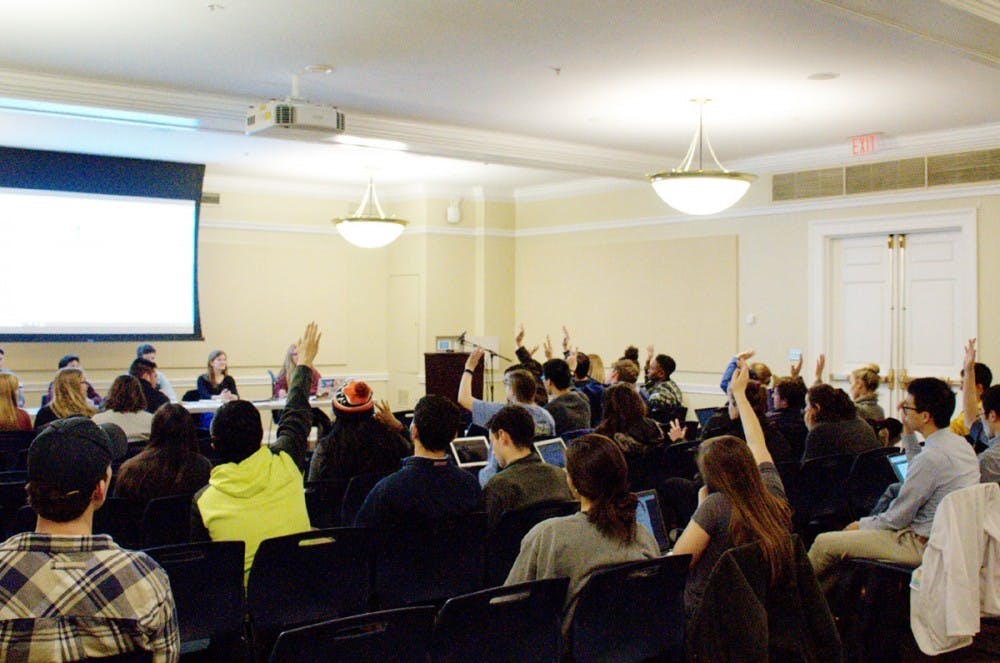At its upcoming general body meeting this Tuesday, Student Council will vote to approve the organization’s summer budget. In its current form, the budget allots $22,121 between committees and Executive and Administrative Operations costs. Funding for the budget comes from two sources, including the Student Activities Fee — which every University student must pay — and is used to fund the operations of Contracted Independent Organizations and other student groups on Grounds. Non-SAF funds are raised by Student Council by other means, such as the Activities Fair and the organization’s endowment.
Of the total summer budget, Executive and Administrative Operations will receive $7,975 to split between several summer and early fall events, such as the Fall Activities Fair. The budget also allows for $4,000 of discretionary spending, the use of which is governed by the Executive and Administrative Operations branch. While discretionary spending is an important component of Student Council’s ability to respond to unexpected events in the University community, the current budget overestimates the amount needed. At the meeting on Tuesday, Student Council Representatives should vote to reallocate some of the money dedicated to discretionary spending towards ventures that would ensure a meaningful impact on the student body.
It is important to note that Student Council is saving money compared to last year’s summer budget. Student Council should be commended for its cost-saving measures — an almost 15 percent reduction in the summer budget shows the organization’s dedication to efficient spending. In 2017, Student Council allocated $25,787 — $3,666 more than this summer’s budget. In addition, the current budget allocates $1,375 less in Executive and Administrative Operations costs, a product of a lower Fall Activities Fair cost and the absence of a Student Council leadership retreat. Discretionary spending, however, has remained at $4,000 these two years. We are not calling for further reductions in the overall spending. Rather, we think these discretionary funds would be better spent in other areas of the budget, such as the Safety and Wellness or Academic Affairs Committee.
If some of these discretionary funds were allocated to the Safety and Wellness Committee, the committee would be able to expand its trial of free menstrual hygiene products taking place in the early fall. This experiment is modeled on a similar event this semester, where free menstrual hygiene products were placed in Newcomb Hall bathrooms throughout two weeks in March. By expanding products’ availability to buildings on Grounds, the committee will more accurately demonstrate the need for a long-term version of this program.
As of now, the program will receive $150 of non-SAF funds to purchase menstrual hygiene products and place them in Madison House. The usage of these products will be recorded and presented to the University administration with the goal of convincing the University to pay for a long-term version of this trial run. Though the data collected will provide some guidance, the experiment needs to be expanded to show demonstrable need. Since Madison House is not located on Grounds, the products will not be accessible to all students, and therefore cannot provide accurate usage data. Student Council should reappropriate some of the discretionary spending to expand this program to buildings on Grounds, which would bolster the results and hopefully provide the administration with more reason to fund such a program.
Alternatively, discretionary funds could be used to support one of Student Council President Alex Cintron’s platform goals for the upcoming year — supporting transfer students. In his platform, Cintron recognized transfer students, “are systematically ignored and forgotten by the institutions designed to advise and support students academically, socially, and financially.” Allocating some of the discretionary funds to the Academic Affairs Committee would allow expansion of programs like the Transfer Advisory Board and the Transfer Peer Advisors Program to help smooth students’ transition into the University community. Allocation of these funds in the summer budget — as opposed to the 2018-19 full-year budget — is appropriate because many students transfer into the University in the fall, and these resources need to be available by the time they get here.
Without question, the Executive and Administrative Operations branch needs access to discretionary funds. The ability to plan programs in response to unexpected events is a key part of Student Council’s role in the University community. For example, discretionary funds were used to plan events such as a candlelit vigil after the events of Aug. 11 and 12 and a candlelit vigil in memory of Otto Warmbier. The sheer magnitude, however, of the discretionary fund is questionable. Some of the $4,000 can be allocated to other Student Council initiatives without sacrificing the Executive and Administrative branch’s ability to respond to events as they arise. Given the difference between the 2017 and 2018 summer budgets, representatives should continue to recognize the potential for more effective use of these funds and vote to reallocate some money to other initiatives.
The Cavalier Daily Editorial Board is composed of the executive editor, the editor in chief and three at-large members of the paper. The board can be reached at eb@cavalierdaily.com.







